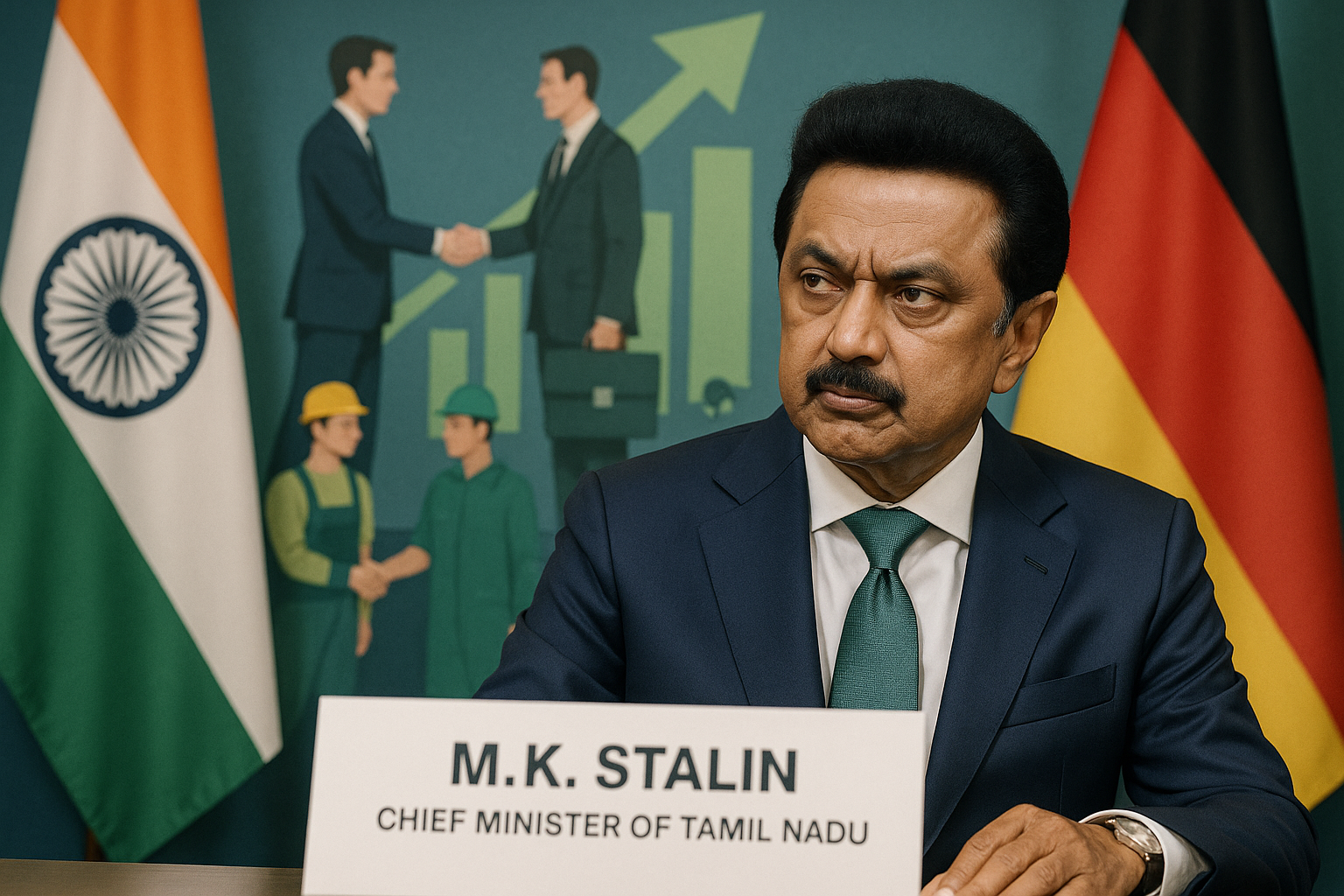Tamil Nadu has signed 26 investment MoUs worth ₹7,020 crore during Chief Minister M.K. Stalin’s visit to Germany, a move that is expected to generate more than 15,000 jobs across multiple industries. This landmark development underlines the state’s reputation as a leading investment hub in India.
The agreements also showcase how state-level diplomacy is reshaping India’s global economic engagement, with Tamil Nadu positioning itself as a bridge between Indian manufacturing strength and European industrial expertise.
Core Development
Chief Minister M.K. Stalin’s official visit to Germany culminated in the signing of 26 Memorandums of Understanding (MoUs) with global investors. Collectively valued at ₹7,020 crore, these agreements are set to create thousands of new jobs in Tamil Nadu, covering both direct and indirect employment.
The MoUs span diverse sectors, including manufacturing, technology services, and engineering, reflecting the state’s strategy to diversify beyond its traditional automobile, textile, and electronics clusters. For Tamil Nadu, these agreements are not merely financial commitments but a sign of global confidence in its governance, workforce, and policy stability.
Global and Economic Context
Germany is Europe’s industrial powerhouse, known for its engineering excellence and advanced manufacturing. By directly partnering with German companies, Tamil Nadu is opening channels for technology transfer, sustainable industrial practices, and higher-value job creation.
This outreach comes at a time when global supply chains are shifting away from heavy reliance on China. European firms are increasingly seeking alternatives, and India — with Tamil Nadu at the forefront — is emerging as a credible, competitive, and stable destination.
Key Drivers of Investment
The success of this visit lies in a combination of factors. Tamil Nadu’s strong industrial corridors, world-class ports, and logistics network offer unmatched access to both domestic and international markets. Its highly skilled workforce, supported by technical institutes and vocational training programs, continues to attract global companies.
Equally important is the Tamil Nadu government’s proactive investment outreach. By meeting investors directly in Germany and offering policy clarity, CM Stalin demonstrated the state’s readiness to facilitate large-scale projects. This state-driven diplomacy mirrors global best practices and complements India’s national FDI promotion efforts.
Stakeholder Impact
The benefits of these MoUs extend across multiple stakeholders. For investors, Tamil Nadu provides a predictable, growth-oriented industrial ecosystem. For policymakers, the agreements strengthen India’s ties with Germany and add credibility to its global investment pitch. For citizens, the most direct impact is job creation — with over 15,000 new opportunities expected in high-growth sectors.
In addition, the investments are likely to create ripple effects by boosting ancillary industries, encouraging entrepreneurship, and enhancing skill development in the state. This aligns with Tamil Nadu’s long-term vision of inclusive and sustainable growth.
Industry and Policy Reactions
Experts have welcomed the MoUs as a reaffirmation of Tamil Nadu’s leadership in attracting foreign investment. Industry observers note that while India as a whole is competing for global capital, Tamil Nadu has consistently stood out for its infrastructure, governance, and investor-friendly policies.
Policy analysts also highlight that these agreements reflect a broader trend of Indian states directly engaging with foreign governments and businesses, complementing New Delhi’s national-level diplomacy. Such bottom-up initiatives enhance India’s overall competitiveness in the global market.
Challenges and Execution Risks
Despite the optimism, the actual impact of these MoUs will depend on effective implementation. Issues related to regulatory approvals, land availability, and infrastructure readiness could delay progress if not addressed swiftly. Another challenge lies in workforce alignment — ensuring that the local talent pool can meet the needs of advanced industries entering the state.
Moreover, global uncertainties such as fluctuating energy costs, trade tensions, and inflationary pressures could affect the pace of investment deployment. Tamil Nadu will need to maintain a fine balance between rapid execution and policy stability.
Strategic Outlook
If successfully executed, the MoUs could position Tamil Nadu as a gateway for European investment into India, creating a long-term pipeline of capital and technology inflows. Over the next few years, the state could evolve into a model of how proactive state-level diplomacy can attract high-value FDI.
This development also sends a strong signal to other Indian states: international engagement at the subnational level can be a powerful catalyst for growth. By setting this example, Tamil Nadu is not only boosting its own economy but also contributing to India’s ambition of becoming a $5 trillion economy.
Why This Matters
The ₹7,020 crore worth of MoUs signed in Germany highlight more than just numbers. They symbolize Tamil Nadu’s growing global credibility, its ability to deliver jobs, and its role in driving India’s investment story forward.
For businesses, the deals open doors to one of India’s most reliable industrial hubs. For citizens, they promise livelihoods and growth opportunities. For India, they reflect the importance of state-led initiatives in shaping the country’s global economic destiny.












